
The area of Zarati river sub basin belongs to important water recharge zones. There is, however, a need to restore the area, which has been susceptible to degradation. Action has been taken in a bottom-up manner, applying Participatory Rural Assessment. Important lessons can be drawn from this in terms of IWRM, as it sets a clear example of active participation of the communities and the local authorities.
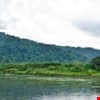
To protect the Panama Canal Watershed, which was created when the Panama Canal was constructed, formal limits to its utilisation was set up, including the Panama Canal Treaty and the creation of a Panama Canal Authority. This case study predominantly illustrates the peculiar problems that arise when a highly artificial watershed is managed by a modern, internationally oriented public corporation with a country that is still copping with the hydraulic culture and a national water policy.

The legal and regulatory framework of water utilities in Peru provides opportunities for local financing of investments. Despite this, the sector remains heavily dependent on public financing. Action has been taken by the World Bank to initiate a study investigating the barriers to local private funding. This case study illustrates that public loans, private loans and equity investment are appropriate to fund the necessary investment.

The lowland valley of Chancay-Lambayeque watershed is scarce of water resources, forcing farmers to irrigate with insufficiently treated waste water, resulting in severe health issues. Action was taken through the project “Future Development of San José farmer community: Wastewater” which was a collaboration between the private and the public sectors, aiming to illustrate alternative ways to irrigate. The most important lesson is that cooperation is an important instrument for development.

The water resources of The Bahamas are threatened by over-abstraction, misuse and pollution. In the past, water management in the Bahamas has been conducted through a single-sector approach. To address its issues, actions have been taken to move towards IWRM and a multi-sector approach. In particular, attention has been focused on improving stakeholder participation and advancing political commitment. Presently only being partially successful, IWRM implementation in Bahamas highlights that it is a long term process.
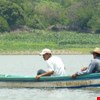
The quality of groundwater recharging the Guarani aquifer is threatened in some areas by rapid land-use changes, and locally by rapid urbanisation. Action was taken by the World Bank through a GEF-funded project on the ‘Sustainable Development & Environmental Protection of the Guarani Aquifer’, which included scientific studies, institutional provisions and transboundary groundwater management. This case study reinforces the lesson to ‘think globally but act locally’.
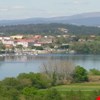
Caribbean countries face a number of challenges in maintaining adequate supplies of water for their populations. Challenges range from low annual rainfall levels to inadequate storage, polluted water sources, and poor management of existing water resources.
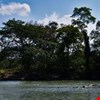
The Lempa River is shared by Guatemala, El Salvador and Honduras, making its management a good example of transboundary cooperation. To reach consensus, action was taken to develop a treaty as part of a regional process. However, since the treaty was not accompanied by strategies designed by local actors, it is somewhat weak. Nonetheless, this case illustrates that political willingness is crucial for advancing towards IWRM in transboundary watersheds.
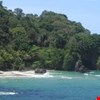
The Goascoran River basin is shared by Honduras and El Salvador and is of great environmental, economical and geopolitical importance. In 2006, action was taken to create a multi-sector instance to integrate, influence and coordinate sustainable management of the shared basin. This experience is of great value for IWRM, as the management group establishes a model of work for transboundary management.
Wathersheds of Tacana originate on the volcano, with both shared by Guatemala and Mexico. This region is of great strategic importance for both countries since they supply water to a large number of residents in the cities located downstream and are the main source of irrigation water for agriculture. In the lower reaches, fishing is an important source of income.